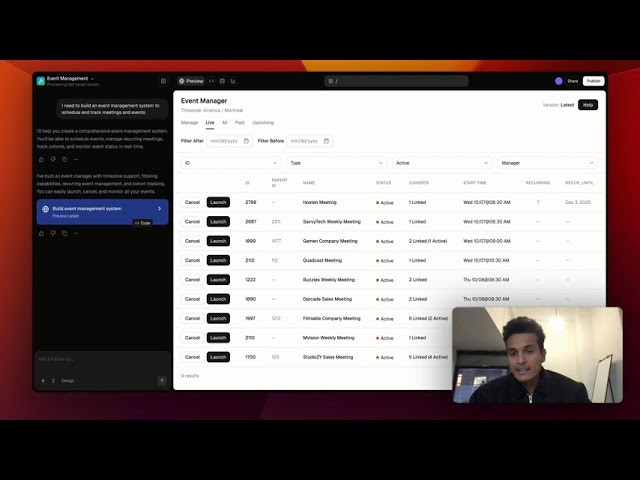
Table of Contents
Overview
In today’s fast-paced business environment, the demand for custom internal tools often outstrips development resources. Fabrica is an innovative AI-powered platform designed to bridge this gap. Fabrica empowers businesses to build sophisticated internal software—from dynamic dashboards to custom applications—through natural language conversation, connecting directly to existing internal databases and tooling. It’s a transformative solution for teams seeking to rapidly deploy enterprise-grade applications without extensive coding.
Key Features
Fabrica comes equipped with a comprehensive set of features designed to streamline internal tool development while maintaining enterprise-grade security and functionality:
- Connects to internal databases: Seamlessly integrates with PostgreSQL, MySQL, SQL Server, Snowflake, BigQuery, Redshift, and other data sources
- Builds dashboards and apps via natural language: Leverage conversational AI to describe and generate internal software, making development accessible to non-technical users
- API integrations: Extends functionality by connecting to popular business applications including Salesforce, HubSpot, Zendesk, Intercom, Google Sheets, and custom REST/GraphQL endpoints
- End-to-end data encryption: Ensures the highest level of security for sensitive business information, protecting data both in transit and at rest
- Role-based access control with SSO: Manages user permissions and streamlines authentication for enterprise environments using SAML and OAuth, enhancing security and compliance
- Real-time dashboards and monitoring: Provides immediate operational insights and maintains application stability through error tracking, performance metrics, and usage analytics
How It Works
Fabrica simplifies the complex process of software development into intuitive steps, making it accessible to business users at all technical levels. First, you connect your data sources—whether PostgreSQL, Snowflake, or other internal systems. Once connected, you describe your desired application or dashboard in plain language through a chat interface. Fabrica’s AI then generates the user interface, securely queries your databases, and handles the underlying application logic. Before deployment, you receive previews and can implement approval workflows to ensure everything meets specifications. Finally, the application deploys with continuous monitoring for production stability and performance, making the entire lifecycle efficient, secure, and observable.
Use Cases
Fabrica’s versatility makes it suitable for a wide range of internal business needs, transforming how companies manage data and operations:
- Custom onboarding dashboards: Create personalized dashboards to streamline employee onboarding, providing new hires with essential information and resources
- Sales pipeline analytics: Develop tools to visualize and analyze sales funnels, identifying bottlenecks, tracking performance metrics, and forecasting revenue
- Support ticket management: Build custom applications to efficiently track, manage, and resolve customer support tickets, improving response times and satisfaction
- Finance reporting and reconciliation: Generate tailored financial reports, dashboards for fiscal oversight, and automated invoice matching and payment tracking
- Inventory and contract tracking: Develop systems to monitor inventory levels, manage contracts, track renewal dates, and manage organizational assets effectively
Pros \& Cons
Advantages
Fabrica offers compelling benefits for organizations seeking to optimize internal operations:
- Rapid internal tool creation without developers: Significantly accelerates development cycles, enabling business users to create functional applications quickly without depending on dedicated engineering teams
- Enterprise-grade security and compliance: Features including end-to-end data encryption, role-based access control, and SSO ensure robust data protection and regulatory compliance for sensitive business information
- Comprehensive database and API support: Connects with various internal databases (PostgreSQL, Snowflake, Redshift, BigQuery) and popular business applications (Salesforce, HubSpot, Zendesk), enabling broad functionality and seamless data integration
Considerations
While capable, Fabrica does have practical limitations users should understand:
- Depends on accurate data connections: The effectiveness and reliability of generated applications are directly dependent on the quality and accuracy of configured data sources
- Initial data source setup required: Requires investment of time and effort to properly configure and connect all necessary data sources before application development can begin
How Does It Compare?
When evaluating Fabrica against alternative platforms, its specialized focus on natural language app generation for data-connected internal tools creates distinct positioning. While Retool and Bubble are powerful low-code platforms, Retool operates as a visual drag-and-drop builder extended with code capabilities, and Bubble requires design-level familiarity with visual interfaces. Though both have added AI workflows and app generators, Fabrica specifically excels at translating natural language directly into database-connected applications, making it ideal for organizations prioritizing rapid deployment of data-heavy internal tools over design customization.
Basin represents a direct competitor with similar database-to-app natural language approach, though Fabrica offers more extensive SaaS integrations and enterprise security features. UI Bakery provides low-code internal tools with an AI assistant that generates queries and logic, positioning itself between traditional low-code platforms and natural language builders. Compared to Airtable’s spreadsheet-centric database interface and automation capabilities, Fabrica generates full-scale web applications with complex business logic and custom user interfaces directly from natural language specifications.
For organizations requiring extensive design control for public-facing applications, platforms like Adalo specialize in mobile app creation across iOS and Android. However, Fabrica’s focus remains on enterprise-grade internal data applications where rapid deployment and database connectivity take priority over granular visual customization. Fabrica’s distinct advantage lies in combining natural language simplicity with database-first architecture, creating a compelling solution for teams seeking to democratize internal tool development while maintaining enterprise security standards.
Final Thoughts
Fabrica represents a significant advancement in internal software development, delivering an exceptional blend of speed, security, and accessibility. By leveraging AI to translate natural language into functional, database-connected applications, it empowers organizations to quickly build the custom tools needed to operate more efficiently. While initial data source configuration requires careful planning, the long-term benefits of rapid deployment, robust security, and dramatically reduced development overhead make Fabrica an attractive solution for enterprises committed to innovating their internal operations and unlocking productivity gains across their organizations.

